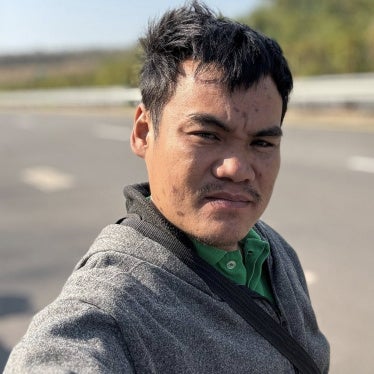While Thai politicians and the army jockey for position and influence to debate a new constitution and the possible return of former prime minister Thaksin Shinawatra, those responsible for at least 91 deaths and 2,000 injuries on the streets of Bangkok in 2010 remain free.
Relatives of those who were killed during clashes between red shirt supporters and security forces register for a compensation scheme for victims of political violence at Rajvithi Home for Girls. Human Rights Watch says this will mean little if the perpetrators are not brought to justice.
One of the victims was Kamolkate Akhad, a 25-year-old nurse who was shot dead when Special Forces soldiers opened fire at a medic tent inside the grounds of Wat Pathum Wanaram on May 19, 2010.
By standing on the elevated train tracks where troops were deployed overlooking the temple, it is clear that whoever fired the fatal shot had a clear sightline and an easy shot. The army knows which soldiers were on the tracks, and who was in operational control.
Kamolkate's killer and superior officers should be easily identifiable by the investigations carried out by the Department of Special Investigation and the police.
But two years have passed and no one has been prosecuted for the nurse's killing.
For Payao Akhad, her mother, the long-running "reconciliation" efforts by this and the previous government are actually aimed at keeping the truth buried. Her views are shared by Nicha Hiranburana Thuwatham, whose husband, Col Romklao Thuwatham, was killed near the Phan Fa Bridge by a 40mm grenade fired allegedly by armed elements within the United Front for Democracy against Dictatorship (UDD), the red shirts, on April 10, 2010.
For them and other victims of the 2010 violence, reconciliation will be meaningless if details about who ordered and carried out abuses are hidden from the public. Yet this seems to be where the reconciliation efforts are heading.
Prime Minister Yingluck Shinawatra has kicked responsibility over to the parliamentary Reconciliation Committee. That committee is now vetting a proposal submitted by the King Prajadhipok's Institute, which has recommended that the report of the government-appointed Truth for Reconciliation Commission should be released with the names of those responsible for violence redacted.
Even worse, the institute's report proposes a broad amnesty for leaders and supporters of all political movements, politicians, government officials, and members of the security forces involved.
Deputy Prime Minister Chalerm Yubamrung recently said a reconciliation bill based on similar principles will soon be submitted to parliament by the ruling Pheu Thai Party and its coalition partners.
Aimed at protecting military and political elites, these proposals are a major blow to hopes for justice, particularly among the large numbers of red shirts who camped out on the streets of Bangkok in 2010 and were the main victims of the violence. Human Rights Watch's report "Descent Into Chaos" documented deaths and injuries as the result of excessive and unnecessary use of lethal force by the security forces and attacks by "black shirts", the armed elements within the UDD.
While justice has been promised, to date criminal investigations have resulted in no charges against anyone. Instead, successive governments have politicised the justice process.
The government of then prime minister Abhisit Vejjajiva summarily and excessively charged hundreds of UDD protesters with serious criminal offences, but it did not file charges against any government officials or soldiers.
The new government has taken a similar approach. Since Ms Yingluck took office last August, the focus of criminal investigations has shifted to cases in which soldiers were implicated while ignoring abuses by "black shirts" on the premise that UDD leaders and supporters cannot be blamed for violence as they were engaged in a noble protest.
Despite clear evidence, the government even claims that there were no armed elements within the UDD.
As the reconciliation proposal was presented to the public, leaders and supporters of the People's Alliance for Democracy (PAD) found themselves slapped with additional criminal charges for violence committed during 2008 protests.
In principle, prosecuting PAD violence is welcome, but it appears to be the mirror image of what the previous government did by charging the red shirts while leaving the security forces alone. Justice should follow the evidence, not the political leanings of those in power.
Impunity has very deep roots in Thailand. For decades, the term "reconciliation" has been used in Thailand not to bring communities together, but to protect powerful soldiers and politicians.
It is a convenient device for suppressing the truth and denying justice to victims of human rights abuses.
In the name of "reconciliation" there were no independent investigations into the crackdowns on students and pro-democracy protesters in 1973 and 1976, which led to the deaths of over 100.
The complete findings of a government inquiry into the bloody 1992 repression of protesters calling for an end to military rule have never been released. In each of these cases, amnesty was given to perpetrators in the name of "reconciliation".
While generals and politicians continued with their careers and lifestyles, victims could do little but suffer in silence.
To end the cycle of impunity in Thailand, Ms Yingluck and her government need to charge those responsible for crimes committed during the 2010 violence, whatever their political affiliation or official position in the military or government. No amnesty should be given for serious human rights abuses.
Victims are waiting for justice, not another round of "reconciliation" that only benefits the country's elites.
It is up to the government, military and opposition to show the principles and leadership to finally break the cycle of impunity that encourages people in power to believe they can get away with murder.
Brad Adams is the Asia director at Human Rights Watch.








